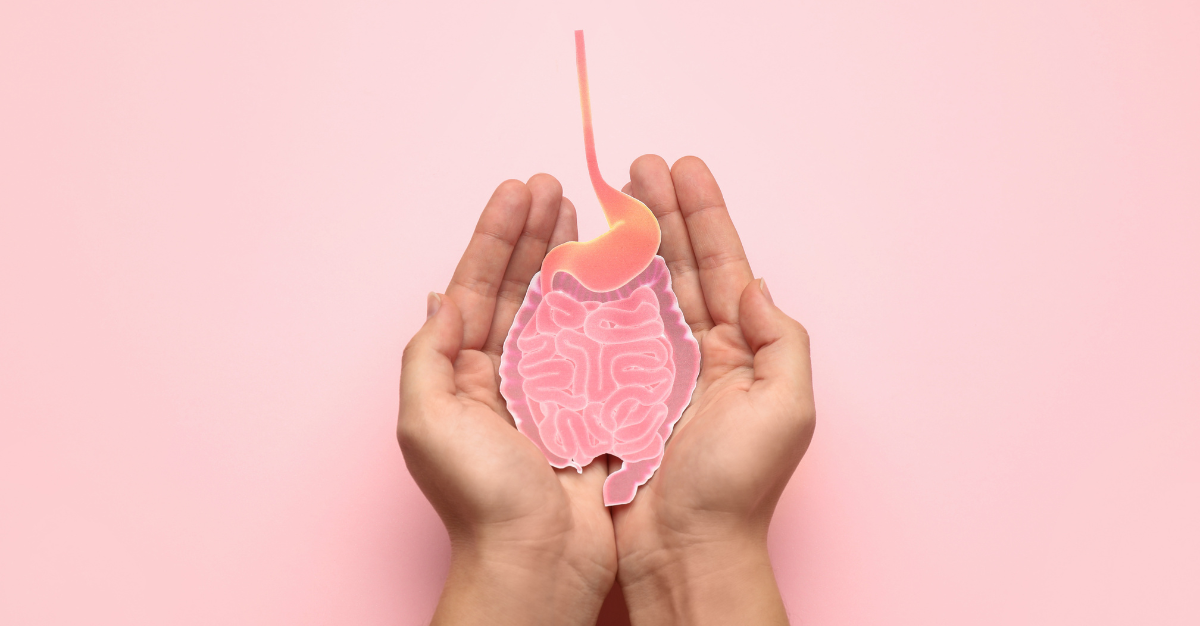By Dana O'Keefe
•
March 22, 2024
A well-functioning digestive system is essential for overall well-being, as it breaks down food into vital nutrients that fuel energy, growth, cellular repair, and more! When your digestion is functioning optimally, you may not even think twice about it. However, when issues arise, they can have widespread effects on your overall well-being. Poor digestion can manifest through signs such as persistent digestive discomfort, irregular bowel movements, nutrient deficiencies, food sensitivities, and unexplained weight fluctuations. Recognizing these indicators is crucial for addressing underlying concerns. In this blog post, we'll explore the top five signs of compromised digestion and provide actionable insights to improve and optimize your digestive health. 5 Reasons Why You’re Not Digesting Properly 1- Stress and Digestive Function You’ve likely felt “butterflies in your stomach” at some point – that queasy feeling accompanied by intense nervousness or excitement. These sensations occur because our gut and brain are intimately connected. If you feel stressed often, it can significantly alter your digestion. The digestive tract has a nervous system of its own called the enteric nervous system or ENS. The ENS contains thousands of complex neurons that control digestive functions. The ENS works in tandem with the central nervous system (CNS) to communicate messages between the gut and the brain. When the brain senses external factors like stress, it releases chemicals that stimulate the ENS to divert blood flow away from the gastrointestinal tract and toward other organs that support survival. When digestion is disturbed, the ENS communicates distress to the brain. Over time, chronically elevated stress hormones will lead to impaired digestive function. Identifying your stressors with non-judgemental awareness can be a powerful first step to improving digestion. Science confirms the value of keeping a mindful eating journal in which you record the trigger of the stress, its symptoms, and any eating activities surrounding it. Recording this information can help you to acknowledge any problematic stress and take action. Other relaxation practices like yoga can powerfully improve digestion. Not only can yoga help reduce stress by allowing us to tune into our thoughts, but certain poses and movements can help increase blood flow to the digestive organs, improving their function. 2 - Imbalanced Gut Microbiome Your gut is filled with trillions of beneficial bacteria, known as the microbiome, which are important for supporting the immune system and metabolism. A diversity of gut bacteria has been linked to human health and longevity, while lower levels of diversity are associated with several acute and chronic diseases. A pillar of good gut health and digestion is maintaining a balance between these good and bad strains of bacteria. If you are experiencing new or uncomfortable digestive symptoms, it could be a sign that the balance of bacteria in your gut is off. Several factors can lead to imbalanced gut bacteria, but these are some of the most common: ● A high-sugar diet. Studies show that consuming large amounts of sugar and processed foods can lessen the amounts of “good” bacteria present in the gut and increase inflammation. ● Antibiotic use. By targeting harmful bacterial infections, antibiotics inadvertently kill off other good bacteria that our bodies need. Increasingly, studies have found that even a short dose of antibiotics can have a profound negative effect on gut diversity. ● Alcohol consumption. In large amounts, alcohol has been shown to increase inflammation and the presence of “bad” bacteria in the gut (also termed dysbiosis). One study looked at the gut bacteria of 41 alcoholics and compared them to 10 healthy individuals who consumed little to no alcohol. Researchers found that imbalance was present in 27% of the alcoholic population, but it was not present in any of the healthy individuals. ● Lack of sleep. Sleep is a crucial ingredient of our overall health, and recent studies have found associations between irregular sleep patterns and harmful bacteria in the gut. Avoiding these red flags and consuming gut-friendly foods can help improve the diversity of your gut bacteria. We recommend: ● Probiotic rich foods such as yogurt, kefir, kimchi, miso, and sauerkraut. ● Prebiotic foods, which feed the good gut bacteria, like bananas, garlic, and asparagus. ● Plenty of fiber found in beans, whole grains, vegetables and fruits 3 - Enzyme Insufficiency Digestive enzymes are naturally occurring proteins responsible for breaking down food and liquids into smaller molecules that the body can absorb. This allows the body to access critical nutrients from food, which it uses to grow and perform vital functions. There are three main types of digestive enzymes: 1. Amylase, which breaks down carbohydrates, starches, and sugars. 2. Lactase, which helps you digest lactose, the natural sugar occurring in dairy products. 3. Lipase, which works with the liver allowing you to digest fats. When your body lacks digestive enzymes or doesn’t release enzymes as it should, several uncomfortable symptoms can occur, such as: ● Stomach cramping ● Malnutrition/Nutrient deficiencies ● Bloating ● Diarrhea ● Gas ● Unexplained weight loss When the pancreas doesn’t appropriately secrete these digestive enzymes, it affects your body’s ability to break down the foods you eat and absorb nutrients. Thankfully, there are steps you can take to support and increase enzyme production for better digestion: ● Digestive enzyme supplements: Many people find that over-the-counter digestive enzyme supplements help with problems such as acid reflux, gas, bloating, and diarrhea. Furthermore, combining these supplements with a probiotic has been shown to be effective. ● Enzyme-rich foods: Certain foods naturally have high digestive enzyme content. Incorporating more of the following can have a positive impact on digestion: Papayas, pineapple, pure honey, avocados, miso, and ginger. 4 - Food Intolerances & Allergies An increasingly common source of unwanted digestive symptoms is food intolerances and allergies. While both can produce similar symptoms, food intolerance does not involve the immune system and is not typically life-threatening like allergies can be. Food intolerance occurs when your body has difficulty chemically processing or digesting certain foods. If left untreated, they can cause several disagreeable symptoms, such as: ● Gas ● Bloating ● Fatigue ● Diarrhea ● Constipation ● Stomach pain or cramping If you are experiencing one or more of these symptoms often, you may have a food intolerance. It can be difficult to pinpoint exactly which food is causing the intolerance, though. We recommend trying an elimination diet if you have suspicions about a particular food–stop eating it for at least a couple of weeks and see how your body reacts! Allergy and food sensitivity testing performed by a practitioner can also be a useful step to take. These are some of the most common food intolerances: ● Dairy. As mentioned above, many people lack the enzymes to digest the natural sugars found in dairy products. Some people also experience a negative reaction to the whey protein within dairy. To identify whether dairy may be at the root cause of your symptoms, it’s important to completely avoid all dairy ingredients for a minimum of 2-3 weeks. ● Gluten. Gluten is a protein that is found in grains like wheat, rye, barley, kamut, oats, and spelt. People with celiac disease experience an immune response when they consume the protein, which over time can inflame the small intestine and lead to serious digestive problems. People who test negative for celiac disease but still experience discomfort when they consume gluten may have a milder form, called non-celiac gluten sensitivity. ● Caffeine. For many adults, a cup or two of coffee is an integral part of their morning routine. However, some people are more sensitive to caffeine and unpleasant experience reactions from consuming just a small amount. Researchers have found that this hyper-sensitivity to caffeine is largely genetic. If small amounts of caffeine cause you to feel anxious, jittery, or have difficulty sleeping, we recommend minimizing your intake and instead opting for decaf herbal teas and coffee. 5 - Dehydration Water is essential for human health. Proper hydration helps lubricate our joints, promotes brain function, and supports healthy skin. Hydration is also a critical factor for improving digestion and gut health. Your body uses fluid to lubricate the digestive system, which helps to move food along as it travels through your stomach, intestines, and colon. If there isn’t enough fluid to keep the food moving, it can get stuck or slow down. This can cause uncomfortable symptoms like constipation or bloating. Fluid is also used to transport the enzymes we discussed that are responsible for breaking food down. When you are dehydrated, it can actually cause inflammation in the intestines due to the constant rubbing of food against them without lubrication. OK, so hydration is important for digestive health, but how much water do we actually need? While water requirements are individual and highly variable based on metabolic needs, environmental conditions, and physical activity, it’s suggested that 2.2 liters (nine cups) per day for women and three liters (12 cups) for men is the ideal minimum amount. Here are a few tips for increasing your water intake: ● Keep a non-plastic water bottle in your car and try to take it everywhere you go! ● Limit caffeine and alcohol consumption, as these dehydrate you. ● Eat thirst-quenching foods with a high water content, such as watermelon, celery, cantaloupe, and spinach. Let’s not forget chewing habits! If you feel like you’ve been eating all the right things, yet are still experiencing unpleasant digestive symptoms, the problem may not be what you’re eating, but how! Yes, chewing plays a larger role in digestion than you may think. We tend to have busy lifestyles here in North America that allow us little time to slow down and enjoy our meals. However, eating too quickly can cause a range of digestive issues, no matter how healthy your diet is. When you don’t adequately chew your food, you’re actually creating more work for your digestive system. In turn, this can lead to stomach issues like bloating, cramps, and even acid reflux. Chewing is an important part of the digestive process, as saliva produces digestive enzymes that help move our food along. Here are a few tips to encourage proper chewing habits & digestion: ● Breathe deeply. Before sitting down to eat, take a few deep belly breaths to promote blood flow and relaxation. Take a minute to pause mindfully before a meal can help with overeating or eating too quickly. ● Pay attention. Rather than hurriedly eating in the car or mindlessly snacking during work, pay attention to what you’re eating and avoid distractions whenever possible. ● Chew 20-30 times. According to recent studies and traditional Ayurvedic practice, the magic number of chews for optimal digestion is approximately 20-30. Chewing your food 20-30 times per bite helps ensure proper nutrient absorption and can help in weight management. Everybody experiences digestive issues at some point. They can be uncomfortable, and embarrassing to talk about, and the root cause is often difficult to pinpoint alone. We have covered some of the most common causes of poor digestion and the lifestyle changes you can make to see improvements. If you have digestive issues that are not corrected with lifestyle changes or are getting worse, seeing a healthcare practitioner for a comprehensive diagnosis and treatment plan may be required. Don’t let poor digestion take control of your life – schedule a consultation with us today! Sources:. Cherpak CE. Mindful Eating: A Review Of How The Stress-Digestion-Mindfulness Triad May Modulate And Improve Gastrointestinal And Digestive Function. Integr Med (Encinitas). 2019 Aug;18(4):48-53. PMID: 32549835; PMCID: PMC7219460. Shree Ganesh HR, Subramanya P, Rao M R, Udupa V. Role of yoga therapy in improving digestive health and quality of sleep in an elderly population: A randomized controlled trial. J Bodyw Mov Ther. 2021 Jul;27:692-697. doi: 10.1016/j.jbmt.2021.04.012. Epub 2021 Apr 22. PMID: 34391308. Hasan N, Yang H. Factors affecting the composition of the gut microbiota, and its modulation. PeerJ. 2019 Aug 16;7:e7502. doi: 10.7717/peerj.7502. PMID: 31440436; PMCID: PMC6699480. Manor, O., Dai, C.L., Kornilov, S.A. et al. Health and disease markers correlate with gut microbiome composition across thousands of people. Nat Commun 11, 5206 (2020). https://doi.org/10.1038/s41467-020-18871-1 Satokari R. High Intake of Sugar and the Balance between Pro- and Anti-Inflammatory Gut Bacteria. Nutrients. 2020 May 8;12(5):1348. doi: 10.3390/nu12051348. PMID: 32397233; PMCID: PMC7284805. The Scientist, What Happens to Your Gut After Taking Antiobiotics, https://www.the-scientist.com/news-opinion/what-happens-to-the-gut-microbiome-after-taking-antibiotics-69970 Bishehsari F, Magno E, Swanson G, Desai V, Voigt RM, Forsyth CB, Keshavarzian A. Alcohol and Gut-Derived Inflammation. Alcohol Res. 2017;38(2):163-171. PMID: 28988571; PMCID: PMC5513683. Bermingham, K.M., Stensrud, S., Asnicar, F. et al. Exploring the relationship between social jetlag with gut microbial composition, diet and cardiometabolic health, in the ZOE PREDICT 1 cohort. Eur J Nutr 62, 3135–3147 (2023). https://doi.org/10.1007/s00394-023-03204-x Mutlu EA, Gillevet PM, Rangwala H, Sikaroodi M, Naqvi A, Engen PA, Kwasny M, Lau CK, Keshavarzian A. Colonic microbiome is altered in alcoholism. Am J Physiol Gastrointest Liver Physiol. 2012 May 1;302(9):G966-78. doi: 10.1152/ajpgi.00380.2011. Epub 2012 Jan 12. PMID: 22241860; PMCID: PMC3362077 Ianiro G, Pecere S, Giorgio V, Gasbarrini A, Cammarota G. Digestive Enzyme Supplementation in Gastrointestinal Diseases. Curr Drug Metab. 2016;17(2):187-93. doi: 10.2174/138920021702160114150137. PMID: 26806042; PMCID: PMC4923703. Zopf Y, Baenkler HW, Silbermann A, Hahn EG, Raithel M. The differential diagnosis of food intolerance. Dtsch Arztebl Int. 2009 May;106(21):359-69; quiz 369-70; 4 p following 370. doi: 10.3238/arztebl.2009.0359. Epub 2009 May 22. PMID: 19547751; PMCID: PMC2695393 Landolt HP. "No thanks, coffee keeps me awake": individual caffeine sensitivity depends on ADORA2A genotype. Sleep. 2012 Jul 1;35(7):899-900. doi: 10.5665/sleep.1942. PMID: 22754033; PMCID: PMC3368971. Widjaja Lukito; Current Evidence in Water and Hydration Science. Ann Nutr Metab 28 December 2021; 77 (Suppl. 4): 1–6. https://doi.org/10.1159/000521769 Li J, Zhang N, Hu L, Li Z, Li R, Li C, Wang S. Improvement in chewing activity reduces energy intake in one meal and modulates plasma gut hormone concentrations in obese and lean young Chinese men. Am J Clin Nutr. 2011 Sep;94(3):709-16. doi: 10.3945/ajcn.111.015164. Epub 2011 Jul 20. PMID: 21775556.




